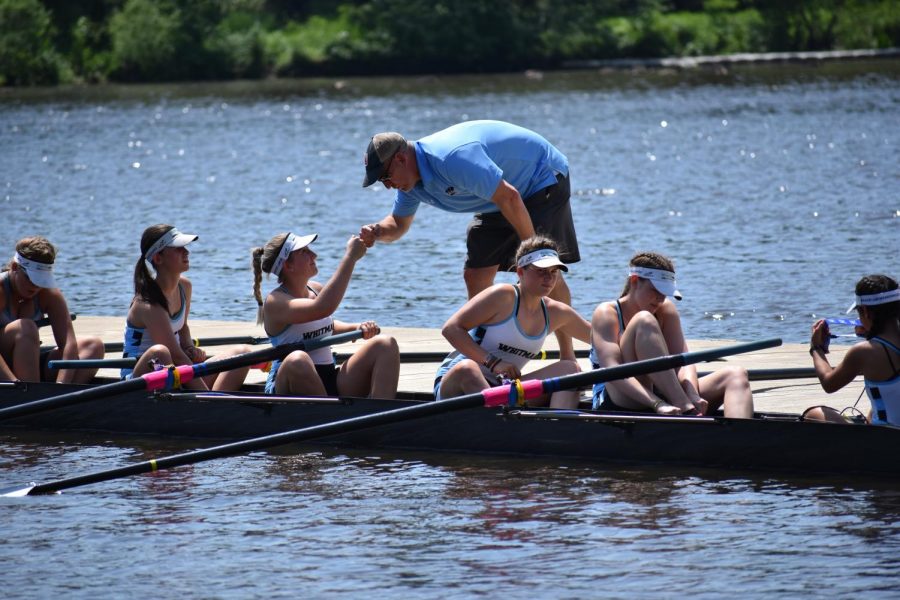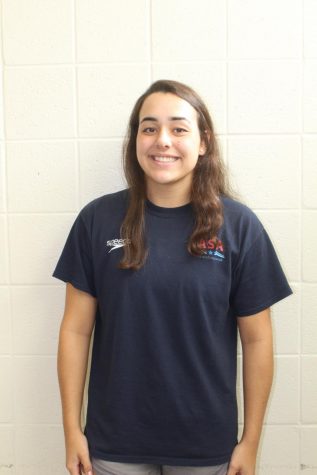Rower Alexa Lyman commits to Cornell after joining crew last year
Crew coach Kirk Shipley fist bumps Lyman before a race, something he does at every regatta.
January 14, 2019
Senior Alexa Lyman is used to change. Since she was four years old, she has competed in nine sports in two countries and five states. So when she had to switch from paddling on the Pacific Ocean to rowing on the Potomac River, she was prepared to face another adjustment head on.
And change isn’t the only thing she’s good at: after picking up rowing less than a year ago, she’s committed to Cornell University for crew.
“It’s unbelievable how she went from someone who had never been in a boat before to a Division I recruit in less than 365 days,” coxswain Rachel Halliday said. “She has the kind of mentality that a lot of people don’t have to be able to push herself really hard.”
With her dad on active duty in the Army, Lyman lived in Germany as well as four states before she was in fifth grade. When fifth grade started, she moved to Oahu, Hawaii.
There, Lyman transferred schools her freshman year. A state regulation intended to prevent football players from transferring prohibits Hawaiian students from playing the same sports at different schools. This rule prevented Lyman from continuing to play softball, which she played at her old school. So instead, she picked up Hawaii’s official state team sport: outrigger canoe paddling.
Outrigger canoes, different from racing shells, have one or more lateral support floats attached to the sides. In the canoe, paddlers face forward with their legs underneath them, whereas in the shell they sit facing backwards. Because of the different positioning, the paddling and rowing motions are very different. Crew requires more whole body engagement, Lyman said.
Lyman paddled for her school and a club team, training every day after school. School season was during the winter, with three- to six-mile open ocean long distance races. The summer was sprint season: her club team competed in half-mile races. During the summer, her team traveled all around the island to race in different regattas, including the state championship, where they placed second.
“I instantly fell in love with paddling and decided that water sports were what I wanted to continue doing,” she said. “Water sports allow me to be outside and stay in touch with nature. You experience some type of serenity that’s hard to find elsewhere.”
But at the end of her sophomore year, Lyman’s family moved again—this time to Bethesda. After only two years of paddling, she had to leave the sport behind.
“It was heartbreaking. I felt like I had an intense emotional connection to it,” she said. “I never felt that with softball or volleyball, partially because I didn’t feel the same connection with my teammates.”
Her parents said this move was particularly hard for her.
“There was always a beautiful backdrop to the sport: the clear blue waves, pretty coastlines, beautiful wildlife. Outrigger canoe paddling was very unique,” her father, Andy Lyman, said. “When we told Alexa we were moving from Hawaii, she was not particularly happy.”
But, Lyman’s family discovered the Whitman crew program. In the spring before they moved, she visited Bethesda and met the coaches and rowers at a crew practice. She enrolled at Whitman at the start of her junior year and began the transition from paddling to rowing. Lyman translated some of her paddling skills into her rowing, she said.
“Paddling in Hawaii kind of helped me to understand water dynamics and what it takes to be an endurance athlete,” she said. “It also allowed me to learn what the application of power feels like, so I was able to transfer that concept into rowing.”
During the winter training season—when the team takes a break from the water—Lyman vastly improved her speed on the erg, an indoor rowing machine, making her one of the top eight rowers on the team.
In February, Lyman began to consider college rowing. She thought about walking onto a team or searching for an uncompetitive program.
But when she returned to the water in the spring, she wasn’t as technically advanced as the other rowers.
“I think she was frustrated at the beginning of last spring because throughout the winter she had all of these expectations of what it would be like to be on the water,” Halliday said. “She wasn’t there yet because she didn’t have the experience.”
But the technical setback didn’t stop Lyman from training hard, girls varsity crew coach Kirk Shipley said.
“It’s not just that she works hard, it’s that she really enjoys work,” he said. “She enjoys learning and she likes a challenge. She’s very good at listening, feeling and learning.”
After improving throughout the spring, Lyman began receiving offers from more competitive programs. While her teammates began the recruitment process in the winter of junior year, she started at the end of summer, right before starting senior year.
“When I started crew, I started with the intention of just playing a sport. I didn’t expect it to lead to this,” she said. “But then the opportunity presented itself, and I knew I’d always regret it if I didn’t take advantage of it.”
The Ivy League dominates women’s collegiate rowing, so Lyman will row against some of the best rowers in the country next year at Cornell. She feels both nervous and excited, but the program seemed like a good fit, she said.
“My impression was that the team was very close knit and supportive of one another, and I think that’s what I’m most excited to be a part of,” she said. “I’m nervous about the competition, but I’m also nervous about the competition here. Competition just comes with the nature of sports.”







